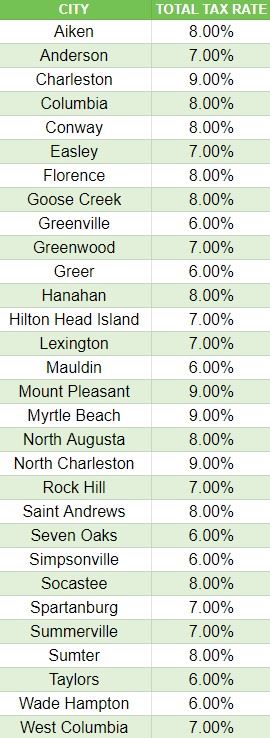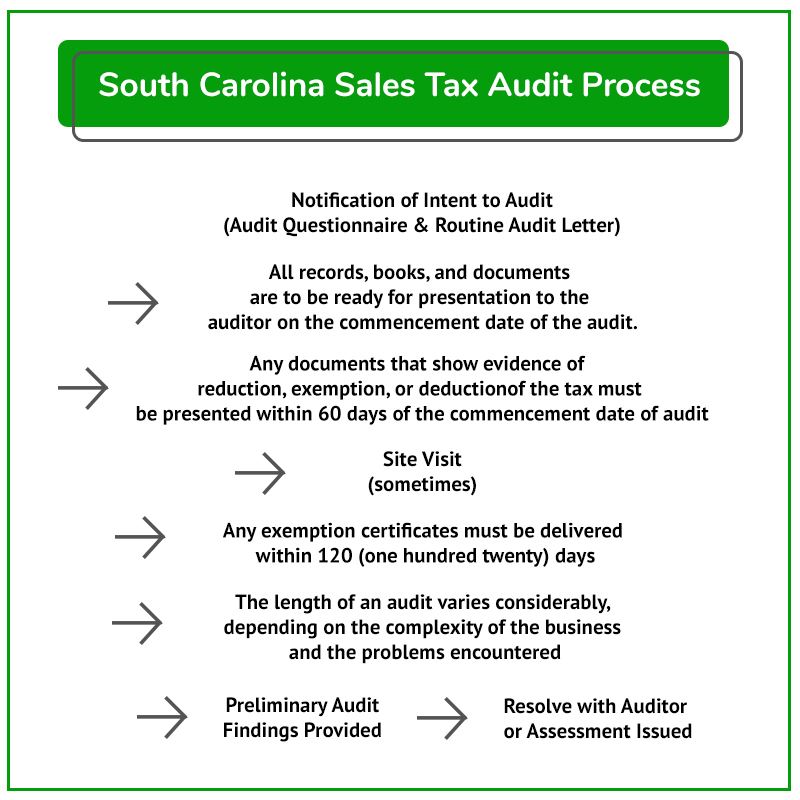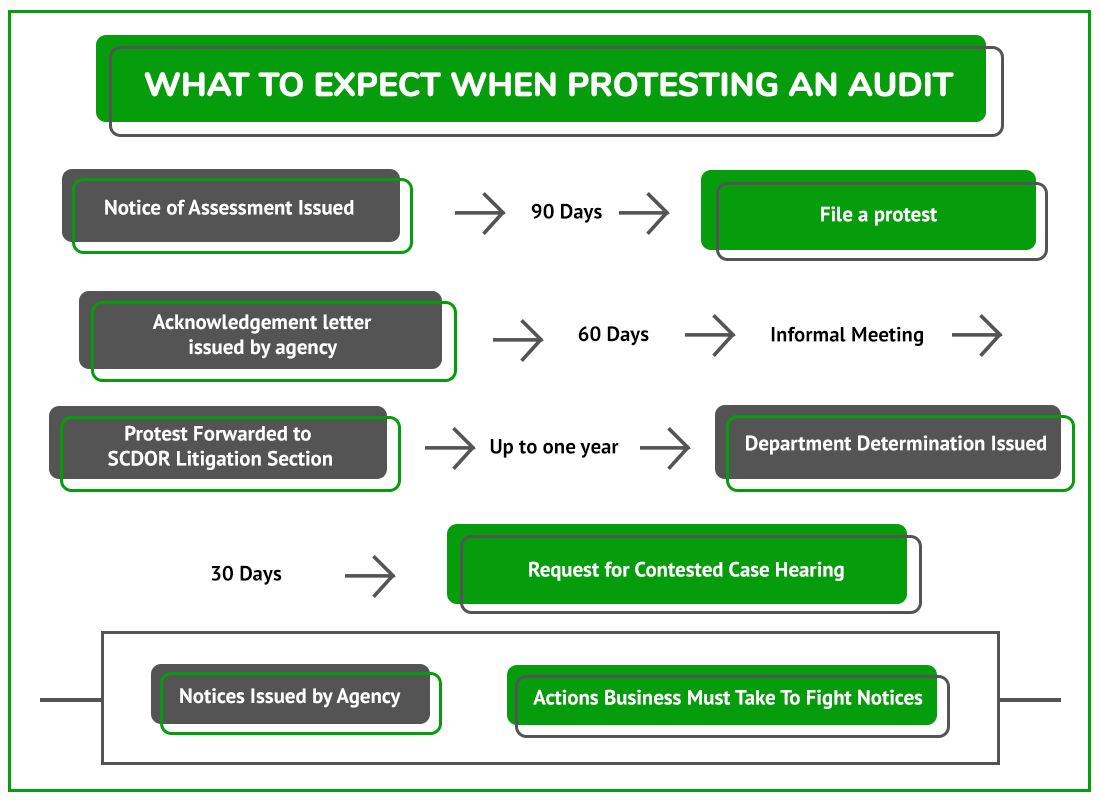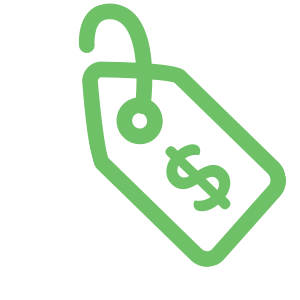
South Carolina Sales Tax & Audit Guide
Straightforward Answers to Your South Carolina Sales Tax Questions.
- Do I need to collect South Carolina Sales tax?
- Should I be collecting or paying South Carolina Use tax?
- What do I do if I should have been collecting but haven't?
- I received an audit notice. What should I do?
- Guidance on fighting a sales tax assessment in South Carolina.
Who Needs to Collect South Carolina Sales and Use Tax?
Retailers who make sales of tangible personal property for storage, use, or other consumption must obtain a retail license from the Department of Revenue when any of the following conditions are met:
- Retailer maintains a place of business in South Carolina.
- Retailer qualifies to do business in South Carolina.
- Retailer solicits and receives purchases or orders by agent or salesman in South Carolina.
This also applies to those who open an online business in South Carolina. If your online business provides taxable products or services, you must obtain a sales/use tax license and follow all the statutes that apply to a store-front business.
How is Nexus Established in South Carolina?
Nexus is a connection between a person and a state and an adequate relationship between an activity, property, or transaction. It allows the state to subject the person and the activity, property, or transaction to its taxing jurisdiction.
For sales tax purposes, nexus is determined when the taxpayer has a physical presence in the state.
However, out-of-state retailers (remote sellers) that have no physical presence in South Carolina may have nexus if they meet the economic thresholds noted in the next section.
Economic Nexus (Wayfair Law) and Internet Sales in South Carolina
In South Carolina, remote sellers whose gross revenue from sales of tangible personal property, electronically transferred products and services delivered into South Carolina exceed $100,000 in the previous or current calendar year have economic nexus with South Carolina and are responsible for obtaining a retail license and remitting South Carolina Sales and Use Tax.
How is the $100,000 gross revenue threshold calculated?
The $100,000 economic nexus threshold for remote sellers includes:
the total gross revenue from all tangible personal property sales delivered into South Carolina and includes all taxable retail sales, as well as exempt retail sales and wholesale sales;
the total gross revenue from all sales of products that are electronically transferred into South Carolina, regardless of whether the charges for the products transferred are subject to sales and use tax; and
the total gross revenue from all services delivered into South Carolina, regardless of whether the service is subject to the South Carolina sales tax.
Marketplace Sellers
If all your sales in South Carolina are conducted through a marketplace facilitator’s platform, you are considered a "marketplace seller" and do not need to register to collect South Carolina sales tax. Your marketplace facilitator is responsible for the tax on sales through the marketplace.
Which Sales are Subject to South Carolina Sales Tax?
General Transactions
If you have nexus in South Carolina, the next step is determining whether the products or services you sell are subject to South Carolina sales and use tax.
Unless an item is specifically exempt, sales and rentals of tangible personal property are subject to South Carolina sales tax.
The rules seem simple, but many details make applying South Carolina’s tax rules to your business challenging.
We recommend scheduling a time to review your specific situation with one of our sales tax professionals.
Common Exemptions from South Carolina Sales and Use Tax:
South Carolina has an extensive and very particular list of items exempt from sales tax. All exemptions fall under the following general categories:
- Government Related Exemptions
- Business Related Exemptions
- Agricultural Exemptions
- Educational Exemptions
- General Public Good Exemptions
- Alternative Energy Exemptions
For detailed information about specific exemptions within each of the above categories, please see Chapter 9 of the South Carolina Sales Tax Manual.
See this Sales Tax Exemptions FAQ to learn how to apply for specific exemptions.
Services
In addition to applying to the sale or use of tangible personal property, the sales and use tax also applies to:
- certain communication services
- laundry and dry-cleaning services
- electricity
- the fair market value of tangible goods manufactured or brought by its manufacturer into South Carolina for storage, use, or consumption by the manufacturer.
The compensation received by a dentist, doctor, lawyer, architect, or other professionals in the State of South Carolina is not subject to sales tax. Instead, it is income from personal services. It is subject to South Carolina income taxes, even when such services are performed in another state and even when the professional has an office in another state.
To see a list of the services on which the state may impose sales tax, see Chapter 117-308 of the SC Code of Regulations.
Software
People often have questions about software's taxability as a service (SaaS).
Many states already impose a tax on software as a service. As these options proliferate, states are moving to update their tax laws and, naturally, impose a tax.
To determine whether you need to collect tax on software sales, we highly recommend contacting one of our sales tax professionals to help you sort it out.
For now, we’ve summarized South Carolina’s software tax rules here:
Automatic Data Processing Programs—Software
A computer program is the complete sequence of automatic data processing instructions necessary to enable automated data processing equipment to function in resolving a particular problem. These instructions, commonly referred to as software, may be recorded on or in paper or magnetic tape, cards, discs, or drums or consist of written procedures such as program instructions listed on coding sheets.
Prewritten Programs
The tax applies to total charges for coding, punching, or reproducing prewritten programs, including charges for the tapes or other properties when furnished by the seller or reproducer.
The temporary transfer of possession of a program for consideration for direct use by the customer is a lease of tangible personal property subject to the tax on the total amount paid, even when the consideration is labeled a license fee or royalty payment; and even though royalty payments or payments for a license may continue to be paid long after the original programs are returned to the seller.
Custom Programs
Custom programs are programs prepared for a special customer order, and the gross charges are subject to tax. Custom programs also include selling programs developed through modification of existing prewritten programs. Charges to modify and adapt these programs to a customer's equipment (including testing) or translate a program to a language compatible with a customer's equipment are a part of the sale price of tangible personal property and also subject to tax.
Shipping & Handling
When computing tax liability, charges for freight, delivery, or transportation of tangible personal property sold for use or consumption, separately stating the charge has no bearing on the taxability of the tangible property. Instead, the seller or the purchaser must determine to whom the transport/delivery services are rendered – the seller or the purchaser. See Chapter 6 in South Carolina Sales Tax Manual for a more detailed explanation.
For now, here’s the basic breakdown:
If the seller contracts to have goods delivered to a designated place, the transportation services are rendered to the seller, and the seller must include the transportation/delivery charges in the selling price of the tangible personal property.
Conversely, if the buyer pays the transportation charges, the transportation services are rendered to the buyer and are not a part of the vendor's selling price. In this case, the seller should not include the transportation charges in computing tax liability.
These rules apply regardless of whether the charges are separately stated or billed by the seller from the tangible personal property sold.
Industry-Specific Guidance
While the general sales tax rules seem straightforward, applying those rules can get tricky when gray areas arise. For this reason, the South Carolina Department of Revenue provides some specific guidance for the following industries:
- Accommodations
- Admissions
- Airline
- Arts/Crafts
- Aviation
- Bingo
- Coin Operated Device
- Dry Cleaning
- Electric Cooperatives
- Electric Power
- Manufacturing
- Motor Carrier
- Motor Fuel
- Public Utility
Determining Local Sales Tax Rates in South Carolina
The sales tax rate for most locations in South Carolina is 6%. A county or municipality may impose a local accommodations tax, not to exceed 3%, on the gross proceeds from charges for accommodations to transients. A county or municipality may also set a local hospitality tax, not to exceed 2%, on the sales of prepared meals and beverages sold in establishments and a transportation tax of up to 1%.
Local Sales and Use Tax Tables
Here you can access local South Carolina Sales tax rates or see the chart below for the total tax rates of the most populated South Carolina cities.

*Exact tax rates vary. Occupancy fees and taxes are not included in this table.
I Should Have Collected South Carolina Sales Tax, But I Didn't
Many of our competitors suggest filing a Voluntary Disclosure Agreement in each state. This is a one-size-fits-all solution that isn't always the best. Our sales tax professionals will work with you to determine your business's best and most cost-effective solution.
If you determine your business has nexus, but you have not collected South Carolina Sales tax, here are your options:
- Register and pay back taxes, penalties, and interest, or
- Complete a VDA to cut penalties (and, in some cases, reduce your tax liability and avoid interest).
Here is what you need to know about each option to make the best decision for your business:
Option 1: Register to Pay Back Taxes, Penalties, and Interest
A VDA is not cost-effective if the past liabilities and penalties are minimal. Sometimes the best resolution for a business is to register with South Carolina and pay back taxes, penalties, and interest.
Be wary of the tax professionals recommending a VDA in these cases. They want to make a buck rather than look out for your best interests.
When to consider registration and payment:
If you established nexus less than 3 or 4 years ago.
The sales tax penalty is LESS than the professional fees charged for the VDA.
Your business does NOT have a sales tax collected issue.
Beware: Registering does not generally end past liabilities.
If you're unsure what your past liabilities are, contact us. Our state tax professionals work with you so you can make the right choice for your business.
Option 2: Voluntary Disclosure Agreement (VDA)
South Carolina’s lookback period is three years.
In many situations, voluntary disclosures are a valuable tool to reduce extended periods of past exposure.
The voluntary disclosure limits the lookback period to three years. So, if you should have collected sales tax over the past ten years but didn't, you may benefit from doing a VDA.
A VDA may be a good option for you if:
You established nexus more than 3 or 4 years ago.
You have a sales tax collected but not remitted issue.
The sales tax penalty savings is MORE than the professional fees charged for the VDA.
What to Expect During an Audit
The typical audit process is shown in this flowchart. Detailed guidance for each stage follows in the sections below.

South Carolina regularly audits businesses required to charge, collect, and remit various taxes in the state. Many audits begin with a call from a South Carolina Department of Revenue sales tax auditor.
Shortly after the call, your business will receive a Notification of Intent to Audit. This notification confirms that you were lucky enough to be chosen for a South Carolina Sales tax audit. Common reasons for this include:
- You have a balance due.
- You are due a refund.
- The DOR wants additional information.
It is good to start with getting a state and local tax professional involved to prepare for the audit.
I Received a South Carolina Sales Tax Audit Notice. What Should I Do?
Businesses that receive a sales tax audit notice need to consider the following questions:
- If you don’t have sales tax audit experience, how can you trust that the state's auditor abides by the rules and follows proper procedures?
- How will you know when to provide documents or when to push back?
- Do you thoroughly understand your sales and use tax areas of exposure?
- Controlling the audit is paramount to limiting exposure and shaping the results. Are you confident in doing that on your own?
Unless you can confidently answer these questions, hiring a professional is most likely to be the best option.
Contact us to learn how our sales tax professionals can give you the peace of mind and confidence you’ll need during your audit.
Visit our resource pages for more information to help you make critical decisions during your South Carolina sales and use tax audit.
- The Audit Overview & Selection Process
- The General Audit Process
- Statute of Limitations Extensions & Issues
- Managing the Sales Tax Auditor
What to Expect from a South Carolina Sales Tax Auditor
Here is a summary of the general audit process:
- The auditor will conduct pre-audit research.
- The auditor will often schedule and perform an entrance conference.
- The auditor will request records (many of which the auditor is not entitled to and does not need).
Once the auditor receives the necessary records, they will compare your South Carolina Sales and use tax returns to your federal income tax returns or bank statements to determine whether you reported all applicable or gross sales on your South Carolina Sales tax return(s).
NOTE: A slight error in how the tax was charged on even a single type of transaction can add up to a significant sales tax liability.
Once the auditor is confident all sales are accounted for, they will:
- Review your exempt and out-of-state sales.
- Conduct a use tax audit – the auditor will request accounts documents to ensure you adequately paid use tax on applicable purchases.
Common areas audited include:
- Advertising Expense
- Auto & Truck Expense
- Repair and Maintenance
- Office Expense
- Miscellaneous Expense
- Supplies
- Equipment
After reviewing all information, the auditor will prepare a proposed audit report which shows preliminary findings, and a preliminary amount due or refund. The proposed assessment is the basis for discussion between you and the auditor; it is not a final determination. It may be estimated in cases where requested information has not been provided.
If a business buys an item online without paying use tax, the business is still obligated to remit the tax to West South Carolina. Believing otherwise often leads to shocking results for the unsuspecting taxpayer during an audit. Here is more information on South Carolina Use Tax.
If you have questions about your situation, contact us to discuss it with one of our tax professionals.
After the Audit – Understand and Defend Your Businesses Rights
The auditor will produce an audit report with corresponding work papers to support the South Carolina sales and use tax assessment.
It is advisable to have a sales tax professional present during this meeting. This is your first opportunity to see the auditor's findings. You'll want to push back on areas where they have overstepped their bounds or misapplied South Carolina's sales tax laws.
It's best to hold off on agreeing to the sales tax assessment until a sales tax professional has reviewed it for issues that should be challenged.
| Many businesses wind up drastically overpaying the state because the business owner or in-house accounting personnel weren't well versed in the sales tax laws that, if challenged, could have reduced their sales tax liability. |
In the following sections, we'll cover the process of challenging a South Carolina sales tax audit assessment.
Contesting Audit Assessment After the Audit – The Protest
South Carolina Sales Tax Audit Protest Process Flow Chart

NOTE: If the deadlines are missed, it is implausible that you will be able to have the case reopened.
You will receive a Notice of Assessment or audit report from the DOR. It's essential to review and understand its implications carefully.
The audit report:
- Details of the auditor's findings
- Describes any proposed audit adjustments
- Shows the amount of tax, interest, and penalty due
Audit Closing Conference
The taxpayer has a short period to contest the findings with the auditor. Any issues with the results are handled as follows:
- Issues related to exemptions, proof of tax paid, and calculations are worth addressing with the auditor.
- Legal interpretations of sales tax law are often not resolvable at this stage.
If you cannot resolve this with the auditor, the next step is to appeal/protest the issue.
Appeal/Protest with The South Carolina Department of Revenue
Protest Rights and Audit Finding Confirmation
You have the right to file a protest if you believe the assessment is incorrect. You must file a complete protest within 90 days of the assessment date. This 90-day limitation period is strictly enforced.
Following the protest filing, the Department will issue an acknowledgment letter and hold a meeting, usually within 60 days of the letter, to discuss the case. The purpose of the informal meeting is to allow the business or the sales tax professional to present additional documentation and resolve the matter with the Department of Revenue. The case is forwarded to the General Counsel's office for further review if it cannot be resolved.
Once sent to the General Counsel, a more formal conference is held. If you have not had representation up until this point, it is often worthwhile to have a South Carolina sales tax lawyer or another professional review the case and present it at this level.
Final Decision
The SCDOR Appeals Section conducts a review of your protest and sends a determination letter. If you still disagree with the assessment, your case will be sent for administrative review. https://dor.sc.gov/about/appeals
If the SCDOR Appeals Section agrees with your position, they will inform you that the matter has been resolved.
If the SCDOR Appeals Section disagrees with your position, they will forward your protest to the SCDOR Litigation Section, and a representative of the SCDOR Litigation Section will conduct a full review of your protest.
By law, the SCDOR is required to issue a determination within one year of your initial protest.
Within 30 days of receiving the Department's determination, you have the right to request a Contested Case Hearing from the South Carolina Administrative Law Court if you disagree with the Department's decision.
Unless you request a Contested Case Hearing, any taxes assessed by the Department's determination will be due within 30 days.
If you have received a Certificate of Assessment and haven't talked to someone experienced in South Carolina State tax, now is the time. Do it before these deadlines pass.
Settling a South Carolina Sales Tax Liability
After any critical notices are issued, settling your South Carolina Sales tax case with the South Carolina Department of Revenue is possible by filing a South Carolina Offer in Compromise. The business must meet specific criteria to qualify, but you can get better results negotiating here than with the auditor. However, knowing a fair settlement from an unreasonable settlement will be challenging without experience and knowledge of South Carolina Tax laws.
DO NOT attempt to negotiate a settlement without an experienced South Carolina State and local tax lawyer or other professional.
Contest a South Carolina Jeopardy Assessment
South Carolina may issue a Notice of Jeopardy Determination in certain situations.
The jeopardy assessment gives the South Carolina Department of Revenue the right to try to collect immediately.
Due to the jeopardy nature, the taxpayer only has a very short time to contest the assessment and must place a security deposit to fight the issue.
Appeal to the Administrative Law Court
If you cannot resolve your case with the Tax Department, you still have a chance to fight your South Carolina sales tax assessment in the Administrative Law Court. You can appeal to the Administrative Law Court within 30 days of the date of the final decision by the Appeals Section of the DOR.
The South Carolina administrative law court is an agency separate and apart from the South Carolina Department of Revenue. It specializes in hearing tax cases against state agencies. Ultimately, the case is heard by a neutral administrative law judge who makes detailed factual and legal findings on your case.
While the administrative court is not technically a judicial court, it operates similarly. During the proceedings, evidence is presented, and testimony is elicited. Although not required, it is strongly encouraged to have an attorney or sales tax professional handle your case at this phase for two reasons:
It can be challenging to get evidence admitted if you have never done so before.
Not developing the case record is very likely to cost your business as the case proceeds.
Our team has handled hundreds of administrative court cases. It can help your company receive the resolution you are entitled to. Get in touch with us today.
Other South Carolina Sales Tax Resources
Reviews

-
"Jerry is the best!"
Jerry is the best! I made the mistake thinking I could deal with the use tax auditor on my own not realizing that I would be ...
- Gary O. -
"Sales Tax Helper Can Make Miracles Happen"
Sales Tax Helper can make miracles happen. Jerry was able to wipe hundreds of thousands of dollars off a NY sales tax bill ...
- Zalmi D. -
"I Will Definitely Be Using His Services Again"
Jerry was very helpful and listened to all our concerns. I will definitely be using his services again.
- Joyce J. -
"Representing Our Company Professionally"
Owning a Texas car dealership is demanding work, so taking on a Texas Sales Tax Audit was a daunting task for us – we didn’t ...
- Ata A. -
"Responsive and Provide Invaluable Knowledge"
Salestaxhelper.com is run by true professionals that understand the complexities of operating a multi-state business. They're ...
- Brennan A.
